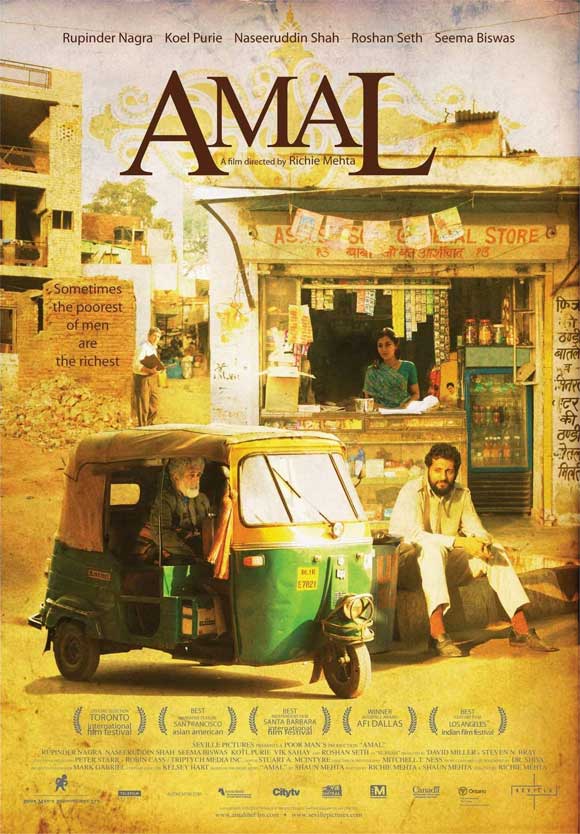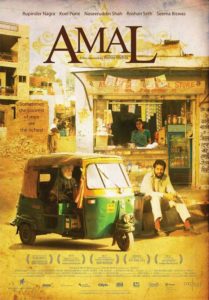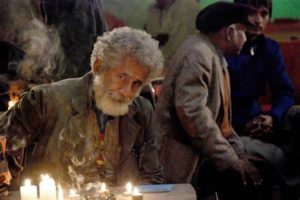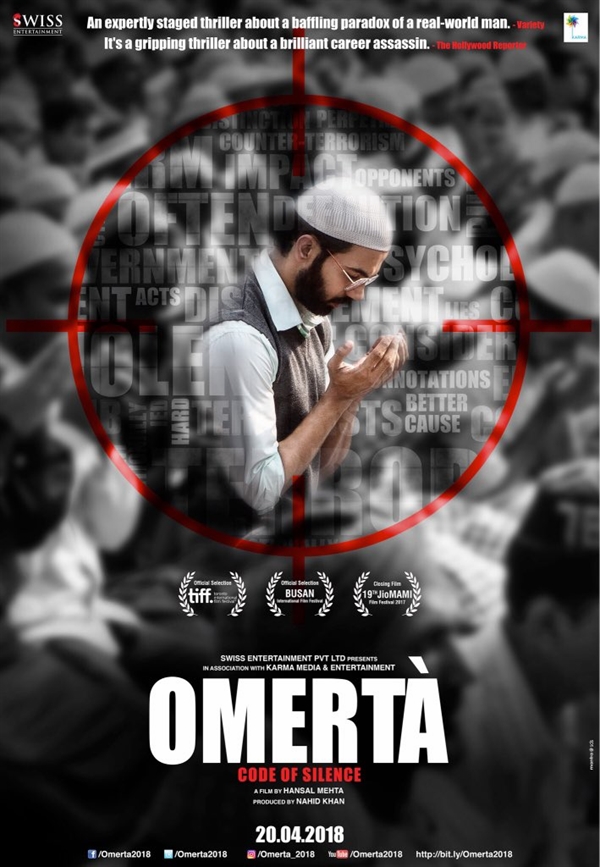
Bollywood Redux Film Review “Amal”
WATCH THE TRAILER HERE
First, the Recap:
Existing with simple, unassuming, but gratifying happiness and ambitions. With a world that so often decides the only measure of actual “success” equals monetary gain, power grabs, and affording the “better things” in life whirls around us, there are some who just enjoy the fact they’re alive, making a living, and taking it all in stride to humble but relevant and satisfying ends, not needing or wishing for more. So, when an auto-rickshaw driver in Delhi named Amal (Rupinder Nagra) picks up a cantankerous old man named G.K. Jayaram (Naseeruddin Shah), it sets in motion a series of events that finds the innocently unsuspecting Amal in the proverbial crosshairs of G.K.’s family lawyer Sapna (Seema Biswas), her colleague Suresh (Roshan Seth), G.K.’s manipulative son Vivek (Vik Sahay), a local crime boss Thakur (Sanjiv Chopra), and a possible new love Pooja (Koel Purie), all due to G.K.’s ride experience that changes his perspective on life thanks to Amal’s unpretentious nature and unlocks unexpected generosity.
Next, my Mind:
Replenishing the pool. When the filmmaking world has its uber directors whose films are among those deemed “automatic hits” every time a project of theirs is released, it should still be realized that while this may satisfy us as moviegoers for some time, there’s always room for bright new brilliance and artistry to emerge, and that is most definitely the case when it comes to Richie Mehta. With an initial entry into the world of Bollywood through several short films (“Anamika”, “System of Units“, and, interestingly enough, “Amal” that would become the feature film this review is covering), two TV Documentary series “The Spirit of South Asia” and “Organic Panic“, Mehta’s immersion into feature film (“Continuum“, “Siddharth“, and the aforementioned project I review here), and now most recently a highly regarded and deservedly lauded Netflix series “Delhi Crime”, it’s time to stand up here in the U.S. and recognize the amazing contributions to quality entertainment the South Asian community of filmmakers offers, both veteran and brand new like Mehta.
The encouraging, propitious, and far more needed influence of affecting belief and healing positivity clashes with the often ominous and highly damaging price of greed’s pull and falsehood’s slippery slopes through this eloquently poignant, beautifully executed feature film from writer/director Mehta, writers Shaun Mehta (based on his short story), Maureen Dorey, Rajesh Tailang, and Roshan Seth, producers Steven N. Bray and David Miller, executive producers Robin Cass and Peter Starr, and coordinating producer Apoorva Bakshi. For this critic, it’s what I classify as one of those “necessary films” in that while its grander messages do highlight the good and bad facets of human nature, it ultimately finds its core themes in what I feel is the deeply essential realms that address the innocence of humbleness, the effects of kindness, the potency of unforeseen and unsolicited generosity, and a viewpoint about life that could honestly change the world, especially in its current chaotic state of being.
The narrative is told from the perspective of an affable, unassuming, steadfast, hard-working auto-rickshaw driver who chances upon a fare that will unknowingly alter his life as well as the remaining life of the man whose own perspective on existence and even humanity itself gets a radical shift, causing him to make a spontaneous and unconventional decision, the ripple effects of which will resonate and likewise change the paths of all who become involved. From that pivotal first moment of unanticipated and initially tempestuous connection to all the events that unfold in its wake, the story delves richly and with evocative intent into the thematic territories of total selflessness, contentment in simplicity, extending kindness to all, sacrificing for others’ wellbeing, grasping hope, learning to accept help from others, confronting greed and those who have more nefarious agendas, the cost of both thoughtful and selfish decisions, and the sheer precariousness and unpredictability of life, so much of it out of our control even when we wish otherwise.
As hinted at earlier, the film does such an adept job at showing a balance of life and being realistic about it, not overly sugar-coating the upstanding elements or watering down the more sobering seriousness of how perpetuating actions through wrong motivations brings nothing but hard consequences. This approach is what makes the film so awesomely relatable for the viewer, as we can absolutely find a multitude of facets being presented that echo our own experiences. But, what then made this effort stand out even more for this critic was a fantastically conceived finale that puts an entirely new twist on all that has been witnessed serving not only as a reminder of the core themes above but also providing a touching, soul-stirring emphasis on what could be the ultimate, most uncomplicated, straightforward concept the film could deliver to us–there ARE good people out there. Period. Yes, how this is encompassed over the whole story is evident through the lead protagonist, but it gets an additional boost of relevance from the conclusion.
I mention quite often in film reviews that I have a huge appreciation for actors who can embody roles that require an overall level of understatement on the surface while still demonstrating a palpable degree of emotional engagement as well, and this was the case once more for me with Nagra through his turn as Amal, an utterly altruistic, noble, decent, and compassionate man whose job as an auto-rickshaw driver pays the bills and allows him the opportunity to try and share his kindness, even when those utilizing his services may not always appreciate it. When he happens upon an old man with an attitude as one of his fares, it becomes an unexpected, albeit very brief, bond that will have results which reverberate through Amal’s and many others’ reality. As he ventures forth unaware, we see how Amal’s work has actually brought him together with more of those people than he realized and leads to an ending that is so apropos for the character, with Nagra’s performance so feasibly heartwarming and filled with quiet but highly present intensity.
The primary supporting roles here are all so excellently performed from a wealth of equally excellent stellar actors including the iconic Shah as the story’s key element, G.K. Jayaram, a seemingly “crazy” old man who’s actually a LOT more aware and in tune with what’s happening than is immediately perceivable but initiates a crucial choice that will cause quite a wave of ramifications. It’s a relatively ephemeral appearance overall, but Shah just chews scenery every time he’s one screen, a complete credit to this amazing actor. Biswas, another film veteran, makes her presence known with precision and strength as Sapna, the Jayaram family lawyer whose questioning of G.K.’s sudden alterations to his will remains in place as the rest of the family is desperate to understand what it reads and entails, and her dogged resolution to keep it under wraps based on the request of G.K. adds an element of tension to the film, with Biswas’ performance buoying this with wonderful purpose.
Seth creates a splash of a different sort through his role as Suresh, Sapna’s colleague who may have slightly different intentions when it comes to the family will and what it might mean in its contents, with plenty of opportunity to plot and scheme while attempting to put forth an honest front, with Seth enacting this duplicity with perfect realism. Sahay, whom I had primarily recalled from his magnificently hilarious role on the former T.V. show “Chuck”, delivers a totally memorable performance here as Vivek, G.K.’s son and who has a FAR more invested in the contents of the will, as it could literally mean life or death based on the repercussions of some poor decisions he’s made and people he’s gotten into the proverbial bed with while trying to live the affluent existence his father’s earnings have allowed him to enjoy. Vivek’s building desperation as events unfurl before him drives him to extremes, and watching Sahay navigate this volatility is awesome to watch.
Purie offers us her effervescent and refreshing presence, infusing a needed element of potential love into Amal’s mix as Pooja, a passenger he picks up one day and whose subsequent experience causes Amal’s initially hidden journey of warmth and sympathy towards another life impacted by it. Pooja soon begins to warm to Amal, trying to show him the basic attention, friendship, and affection to see what might manifest. It’s this insistent, charming, subtly unyielding tactic that really makes Pooja’s character a key factor to Amal’s actuality, and Purie is so blatantly captivating in the role, she captures your heart immediately. Chopra is local crime lord Thakur, whose involvement with the proceedings is actually deeper than one might initially think, and Chopra is perfectly cast to play this style of calm yet menacing force that will not be denied, bristling with that muted yet inwardly burning, brooding demeanor.
Additional appearances are made by Tanisha Chatterjee, Amardeep Jha, Dr. Shiva, Gurpreet Chana, Siddhant Behl, Maya Mankotia, and Asif Ali among many others. So, in total, “Amal” stands, as mentioned above, as the style of film that carries a much-needed message of hope and the wonder of what it is to be a good person and actually SHOW and ACT ON it, be satisfied with what we have, serving and caring for and about others, and realizing that even when certain opportunity might slip by us without even knowing it, that isn’t always a bad thing when it could end up aiding someone else in more need than our own.
As always, this is all for your consideration and comment. Until next time, thank you for reading!





Permalink
Permalink